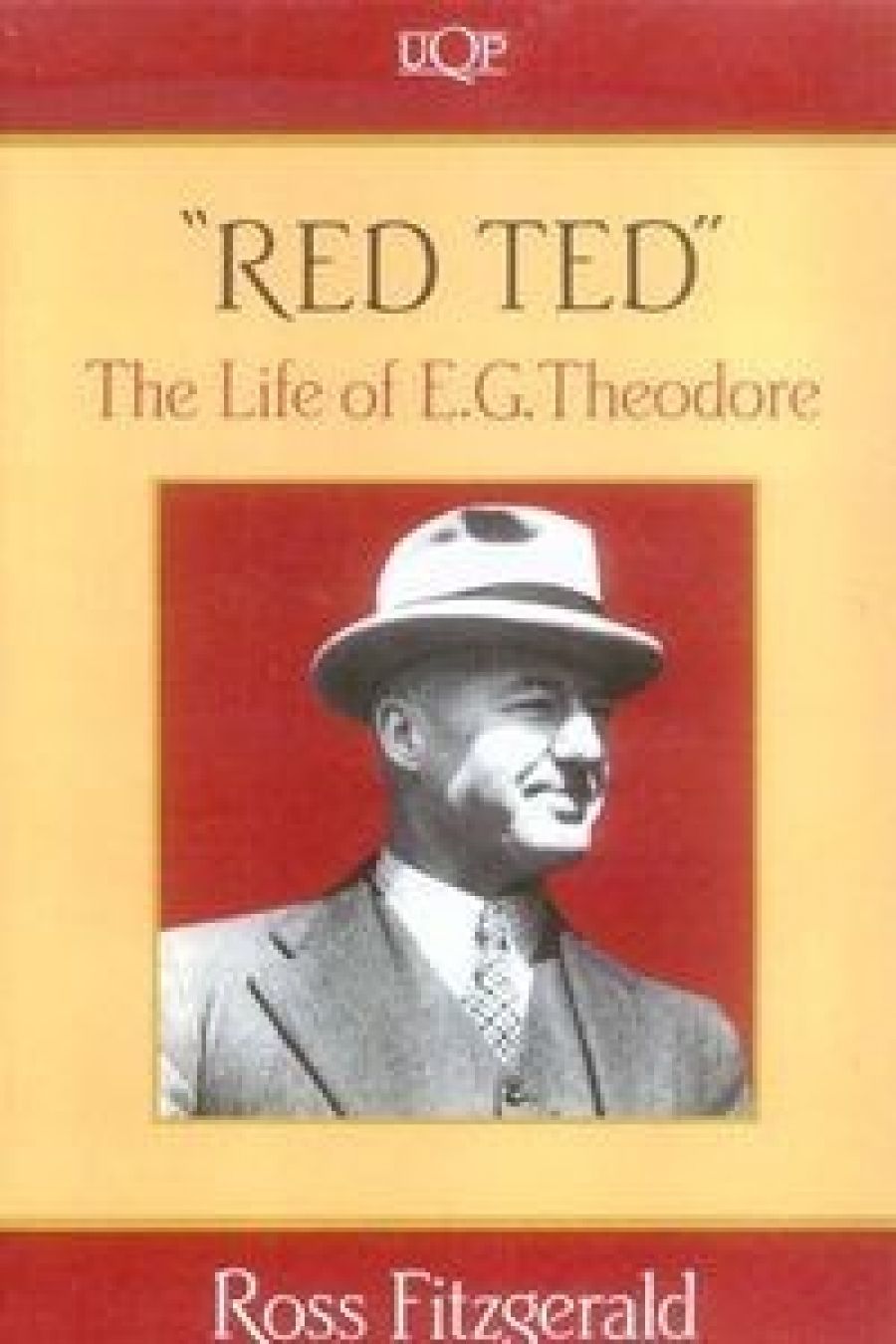
- Free Article: No
- Contents Category: Biography
- Review Article: Yes
- Online Only: No
- Custom Highlight Text:
On the day of the last Federal election, I became engaged in an unlikely conversation with a helper for the ‘Call-to-Australia’ cause at my local polling booth. When I revealed that I had recently completed a research project on Dr H.V. Evatt, my elderly companion asserted that Evatt should not be hailed as the hero of the labour movement. Australia’s greatest politician, this former member of the Australian Labor Party informed me, was ‘Edward Granville Theodore’.
- Book 1 Title: 'Red Ted'
- Book 1 Subtitle: The Life of E.G. Theodore
- Book 1 Biblio: UQP, $24.95 pb
For scholars and members of the public alike, E.G. Theodore’s name has long conjured up alternate images of a man destroyed by the Depression and arch-conservatives, a Laborite who ‘sold out’ to capitalism, and a politician tainted by the smell of corruption. Theodore’s varied career – as Labor Premier of Queensland (1919–1925), Federal Treasurer (1929–1931), cofounder of Consolidated Press and Fijian mining magnate – has informed the work of commentators such as T.H. Kennedy, Neville Cain, Bede Nairn, and R.S. Whitington. The untimely death of Irwin Young, however, left Australians with an incomplete and wholly unsatisfactory profile of Theodore. In Dr. Ross Fitzergald’s ‘Red Ted’: The Life of E.G. Theodore we have what will surely be regarded as a definitive Theodore biography.
Fitzgerald’s book begins with a moving scene of Theodore on his deathbed which is remarkable for its fusion of imaginative flair with available documentary evidence. This chapter exposes one of the greatest strengths of the biography: the author’s ability to relate Theodore’s character and private life to his public career. This has been facilitated, in part, by the as yet unpublished book by Myra Rowbotham, Theodore’s younger daughter. Given that the bulk of Theodore’s papers are believed to have been destroyed by his private secretary and that Consolidated Press refuses to cooperate with researchers, My Father’s Daughter is a particularly valuable resource. Fitzgerald, an admirer of the work of the late Manning Clark, writes with the insights of a novelist, and his treatment of Ted’s estranged wife, Esther, evokes an acute sense of pathos.
The biography’s grasp of the intricacies of labor politics in Queensland and New South Wales in the 1920s is masterly. Fitzgerald has managed to make an account of complex economic policies both interesting and comprehensible. Theodore’s reflationary proposals during the Depression are juxtaposed with Jack Lang’s shallow populism, and Theodore, one of Australia’s most significant Keynesians, is presented as a man very much ahead of his time. The second half of the book is characterised by perhaps the most dazzling – and damning – profiles of Ted’s nemesis, Lang, ever published, and Fitzgerald’s exposition of the differences in the political, economic and strategic styles of the two men is nothing if not convincing.
It could be argued that Fitzgerald is a little too sympathetic to Theodore, but the detailed and coherent account of the circumstances which gave rise to the infamous 1930 Royal Commission into the Mungana Mines affair presents compelling evidence to suggest that the Commission, and its antecedents and legacies, were politically motivated and manipulated by Theodore’s conservative foes. As ‘Red Ted’ progresses, the reader is presented with a portrait of a brilliant, self-educated, introspective, autocratic, aloof and pragmatic visionary whose greatest strengths became perhaps his biggest electoral liabilities.
The biography is not without some flaws. It is unfortunate that the inter-war cultural milieu in which Theodore operated is not dealt with more penetratingly. Little effort is made to evoke the dynamism of the post-World War I era or to explore the inter-relationships between Queensland intellectuals such as Theodore, Brian Penton, and P.R. Stephenson.
And although Fitzgerald frequently, and usefully, refers to Theodore’s literary tastes (which were, predictably, seen as evidence of his anti-Labor orientation), the significance of his subject’s professed admiration for the work of artists such as Norman Lindsay has not been discussed.
It has always been Theodore’s political career which has been the subject of interest for Australian historians; the unfortunate circumstances surrounding the preparation of Young’s biography ensured that Theodore’s role in the formation of Sydney Newspapers Ltd and Consolidated Press Ltd would be almost completely overlooked. Last year, in the sixtieth-anniversary edition of the Australian Women’s Weekly, it was Frank Packer and George Warnecke who were credited with the launch of Australia’s most famous magazine. Fitzgerald has, certainly, remedied this situation by addressing at some length Theodore’s entry into publishing.
But it seems that even Fitzgerald may have underestimated the importance of Theodore’s activities in this arena. For example, Theodore’s role in the launch of the Australian Workers’ Union’s newspaper, the World, his subsequent negotiations with the Union on the part of his syndicate, Sydney Newspapers Ltd, for the lease of printing space for the Women’s Weekly, and his participation in Imperial Press conferences belie the suggestion that he was little more than Packer’s silent partner. Similarly, it would have been helpful to learn more of Fitzgerald’s views on the paternal relationship which seems to have existed between Theodore and a young Frank Packer.
These last observations, however, reflect little more than the personal predilections of the present reviewer! They should not deflect from an appreciation of a lucid, well-written, perceptive and comprehensive biography. I look forward to running into the ‘Call-to-Australia’ gentlemen on next polling day.


Comments powered by CComment